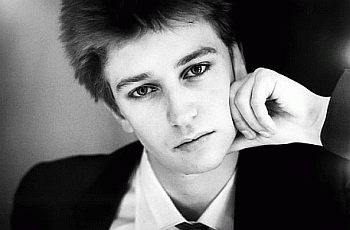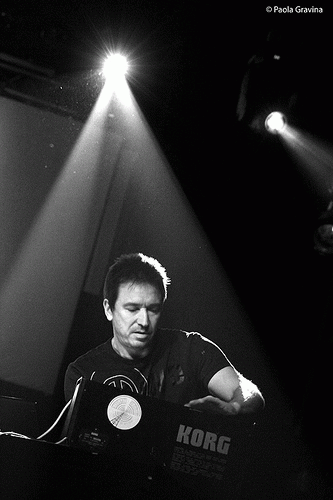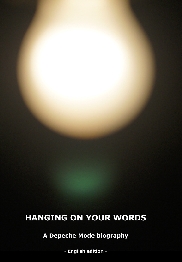ALAN WILDER
Alan Charles Wilder was born 1 June 1959 in London at the Hammersmith Hospital. He is the third child of Albert and Kathleen Wilder and the younger brother to Stephen, born in 1952, and Andrew, born in 1954. No exact dates were mentioned, but Alan said, "My brothers are five and seven years older respectively so they teased me a bit when they were bored, but I think I was too young to be really bothered with."[1]
His place of birth has also been mixed up many times which tempted him to
begin almost all of those "who are you actually and where are you from"-articles
of the early days with: "I don't come from Basildon in Essex."[2]
"I'm happy to say that my knowledge about Basildon is rather
limited, particularly I was there only about three times.
All my visits there were with DM and at a time within the
early days when I was very interested in photography and
always carried a shoulder bag with camera equipment around
with me. My most insistent memory of Basildon is to sit in a
disgusting pub and to get told I better shouldn't cross my
legs and should hide the shoulder bag because otherwise I could be
beaten up because someone might think I was a poof."[3]

(with friendly permission of Alan Wilder)
So, no "Basildon boy". Instead, Alan grew up in Acton,
West-London, in a normal, and presumably conservative, middle
class environment. "The youth isn't so rebellion there like in Basildon,
where the others come from. My parents weren't rich nor poor."[4] They "wanted
their children to have a musical education. Classical
music was played at our house the whole time mainly due to my brothers
practising the piano.[5] One of my brothers is a pianist today and
accompanies different
singers. The other one teaches music in Norway.[6] I was forced to have piano
lessons and do grades,"[7] when he was about eight years old.
"I didn't like practising but
my parents wouldn't let me stop. My interest has
always been with modern music starting from being four, five years old
when I spent some time at our neighbour's house - for babysitting, y'know? -
who heard a lot of music like Manfred Man and so on."[8]
Nevertheless, he was a leading member of the school orchestra and the brass band.
As a second instrument, he learned the flute. And he did well in his piano lessons.
"I got up to grade 8 and now I'm really pleased that I did have them."[9]

Alan wasn't really enthusiastic for the boys' grammar school which
he attended. "I mostly stayed in the background. I was doing quite good, but
I wasn't interested in most of the subject-matter. I only found music and
languages to be absorbing.[10] I simply hadn't the desire
of listening to the teachers. Maybe because it wasn't interesting
enough what they had to tell. I couldn't take schooling seriously
(although I'd love to go back and really learn now) - it wasn't what I
needed at the time. My mind would wander."
He summed his teenage years up with, "I was rude, scruffy, obnoxious,
arrogant and blushed in front of girls." He didn't keep in touch with anyone
from school, had to learn to discern friends from friends.
"It's a well known English trait to resent success in others and I
found most of my 'friends' didn't want to know when things took off for me.
True friends are not like that of course."[11]
"I only got three O-levels because I was lazy [12], left school during the sixth form and went on the dole.[13] There wasn't an idea of what I wanted to do but a lot of things I wouldn't want to do. Then I went back to school once again and tried to study for the A-levels but it didn't work really.[14] My parents pushed me into writing off to recording studios, the only thing I'd expressed an interest in. After being turned down 40 times I got a job at DJM Studios in New Oxford Street. I was a tea boy, really, an over-worked gofer. The only good thing about DJM was that when bands finished studio sessions they'd often leave their instruments behind so I could muck about on a keyboard or bash some drums.[15] It became a strong ambition to be a musician. I was very single-minded about what I wanted to do from the day I got the job at DJM Studios. And, as arrogant as it sounds, I always had absolute conviction that I'd be able to forge a career for myself in music. I had to pay my dues by making tea for other people (for no money), living in a floorless building once, in Hammersmith (much to my mother's dismay, didn't bother me though), and slumming around the toilets of England in various unknown bands for a few years but I still enjoyed it and, more importantly, it made me appreciate success much more when it came."[16]

The first band Alan joined was The Dragons. He moved to Bristol to work
with them. The first song he played on was Misbehavin (sort of 1970s
soft rock stuff) which was released as a single on DJM records
around 1977.
"After two years in Bristol, life got too lethargic so I was glad when a
friend dragged me home to join a band called Daphne and the Tenderspots."[17]
[Some sources also use the spelling "Dafne"].
"They were playing five nights a week at 'Obelix' - a specialist restaurant. They
were playing a mixture of jazz, R & B (in the traditional sense) and blues etc.
I was roped on keyboards for a few quid in my pocket and a free cheese, ham
and tomato pancake at the end of the night. We were also starting to write
our own songs and jumped onto the new wave bandwagon.
After many weeks rehearsing on Graham & Daf's houseboat in Datchet, we managed
to get a rep from MAM records along.[18]
We had all these terrible clothes made and worse skinny ties. We were awful
but again we had a deal and made a single, Disco Hell."[19]
Apparently his parents weren't enthusiastic about his way of life and wouldn't
give him any financial support. There was also a possibility that he had been
too proud to accept money from his parents. It seems as if this led to a longer
break of relationships. Many years later, Alan would say that one of the things
he regretted was that he hadn't been in touch (or seldom in touch) with his
parents for a while because of "some sort of teenage angst".
Life as a musician (in 1977 The Dragons, in 1978
Daphne and the Tenderspots, in 1979 Real to Real with white man reggae and
in 1980 The Hitmen with 1980s Bowiesque rock)
definitely had its dark sides. There often wasn't any money left for quite simple,
essential things. Before Alan joined DM at the end of 1981, he was once
arrested for shoplifting. "I stole a chicken and got caught. I was a struggling
musician at the time, destitute and hungry ..."[20]

(with friendly permission of © Paola Gravina Red)
Today Alan is the father of a daughter, Paris (born in September 1995),
and a son, Stanley (born in January 2001). They date from his
second, meanwhile divorced, marriage with Hepzibah Sessa. His first
marriage was with Jeri Young. With his third partner, Britt Rinde Hvål, he
has another daughter, Clara Lake (born in November 2011).
Alan now works solo as Recoil and has released the following:
1+2 (1986), Hydrology (1988),
Bloodline (1992), Unsound Methods (1997),
Liquid (2000) and SubHuman (2007).
Selected, which was released in 2010, was a kind of Best of.
He released some remixes (even for DM), was the musical and production supervisor
for Spirit Of Talk Talk, a double tribute album, released Collected
about his memorial auction with DM items in 2011 and 2012 and
finally released A Strange Hour in Budapest, a concert film about performing
Selected, in 2012.
Other than in Vince's case I decided not to leave out Alan after he had left the band. His story is too fused with the history of the band (I was especially glad about this decision in 2010). And he (and his website) is an important source. In fact, Alan is prominently mentioned in this biography because there are many more quotations from him than from any other band member, and as most of them were written by himself, it is certain that they are correct.
References:
[1] recoil.co.uk
[2] A Broken Frame Tour Programme, 1982
[3] recoil.co.uk
[4] Depeche Mode Prive (part 1: Alan Wilder), unknown author, media and date
[5] HotNewsTV.ro April 2nd 2010
[6] recoil.co.uk
[7] Alan Wilder: The Band Boy, No. 1, 25 May 1985
[8] HotNewsTV.ro April 2nd 2010
[9] Chatting with Alan Wilder, Henrik Wittgren, September 1997
[10] Depeche Mode Prive (part 1: Alan Wilder), unknown author, media and date
[11] recoil.co.uk
[12] Chatting with Alan Wilder, Henrik Wittgren, September 1997
[13] Alan Wilder: The Band Boy, No. 1, 25 May 1985
[14] recoil.co.uk
[15] Alan Wilder: The Band Boy, No. 1, 25 May 1985
[16] recoil.co.uk
[17] Alan Wilder: The Band Boy, No. 1, 25 May 1985
[18] The Palace and the Punks, Northern Lights Ltd., 2011, author: Tony Hill
[19] Alan Wilder: The Band Boy, No. 1, 25 May 1985
[20] Depechemodebiographie.de

 BIOGRAPHY
BIOGRAPHY